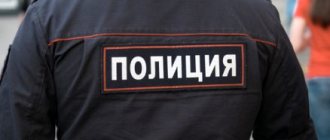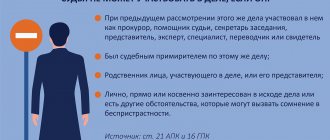New edition of Art. 124 Code of Criminal Procedure of the Russian Federation
1. The prosecutor or head of the investigative body considers the complaint within 3 days from the date of its receipt. In exceptional cases, when in order to verify a complaint it is necessary to request additional materials or take other measures, the complaint may be considered within 10 days, of which the applicant is notified.
2. Based on the results of consideration of the complaint, the prosecutor or the head of the investigative body makes a decision to fully or partially satisfy the complaint or to refuse to satisfy it.
2.1. If a complaint filed in accordance with part two of Article 123 of this Code is satisfied, the resolution must indicate the procedural actions taken to speed up the consideration of the case and the deadlines for their implementation.
3. The applicant must be immediately notified of the decision made on the complaint and the further procedure for appealing it.
4. In the cases provided for by this Code, the inquiry officer or investigator has the right to appeal the actions (inaction) and decisions of the prosecutor or the head of the investigative body, respectively, to a higher prosecutor or the head of a higher investigative body.
Appeals under 125 Code of Criminal Procedure of the Russian Federation
The Criminal Procedure Code of the Russian Federation allows, from the moment an individual or legal entity comes into contact with the law enforcement, investigative, supervisory system of Russia, to check the legality, validity and motivation of the procedural actions of police officers, investigators and prosecutors.
As a general rule, a complaint under Art. 125 of the Code of Criminal Procedure of the Russian Federation is considered by the court at the place where the act containing signs of a crime was committed. At the same time, the judge should not prejudge issues that may subsequently become the subject of trial in a criminal case.
Time limit for consideration of a complaint under Article 125 of the Code of Criminal Procedure of the Russian Federation
namely Article 125 of the Code of Criminal Procedure of the Russian Federation and paragraph 4 of Article 7 of the Code of Criminal Procedure of the Russian Federation (legality and validity)
- Resolutions of the inquiry body, the inquirer, the investigator, the head of the investigative body on the refusal to initiate a criminal case, on the termination of the criminal case, as well as other actions (inaction) and decisions of the inquirer, the head of the inquiry unit, the head of the inquiry body, the inquiry body, the investigator, the head of the investigative body and the prosecutor, who are capable of causing damage to the constitutional rights and freedoms of participants in criminal proceedings or complicate citizens' access to justice, can be appealed to the district court at the place where the act containing elements of a crime was committed. If the place of conduct of the preliminary investigation is determined in accordance with parts two to six of Article 152 of the Code of Criminal Procedure, complaints about the actions (inaction) and decisions of these persons are considered by the district court at the location of the body in charge of the criminal case.
- The complaint may be filed with the court by the applicant, his defense attorney, legal representative or representative directly or through the investigator, head of the inquiry unit, head of the inquiry agency, inquiry agency, investigator, head of the investigative agency or prosecutor.
- The judge checks the legality and validity of the actions (inaction) and decisions of the investigator, the head of the inquiry unit, the head of the inquiry body, the inquiry body, the investigator, the head of the investigative body, the prosecutor no later than 5 days from the date of receipt of the complaint in a court hearing with the participation of the applicant and his defense attorney , legal representative or representative, if they are involved in a criminal case, other persons whose interests are directly affected by the appealed action (inaction) or decision, as well as with the participation of the prosecutor, investigator, head of the investigative body. The failure to appear of persons who were timely notified of the time for consideration of the complaint and who do not insist on its consideration with their participation is not an obstacle to the consideration of the complaint by the court. Complaints subject to consideration by the court are considered in open court, with the exception of cases provided for in part two of Article 241 of the Code of Criminal Procedure of the Russian Federation.
- At the beginning of the court session, the judge announces which complaint is to be considered, introduces himself to the persons appearing at the court session, and explains their rights and obligations. Then the applicant, if he participates in the court session, substantiates the complaint, after which other persons who appeared at the court session are heard. The applicant is given the opportunity to make a statement.
- Based on the results of consideration of the complaint, the judge makes one of the following decisions: recognizing the action (inaction) or decision of the relevant official as illegal or unfounded and on his obligation to eliminate the violation;
- about leaving the complaint without satisfaction.
- Resolution of the plenum of the Armed Forces of the Russian Federation No. 1 of February 10, 2009. On the practice of courts considering complaints in accordance with Article 125 of the Code of Criminal Procedure of the Russian Federation.
- Determination of the Constitutional Court of the Russian Federation No. 42-0 of January 25, 2005.
These documents are the main ones; there are also relevant ones, but less important and fundamental for the application of 125 of the Code of Criminal Procedure of the Russian Federation, including, oddly enough, the constitution.
The right to appeal decisions and actions (inaction) of officials in pre-trial proceedings as a guarantee of judicial protection of the rights and freedoms of citizens in criminal proceedings is established by Article 46 of the Constitution of the Russian Federation. There is no state duty, you don’t need to pay anything.
The right to appeal under 125 Code of Criminal Procedure of the Russian Federation includes
In accordance with this norm, decisions of the inquirer, investigator, head of the investigative body to refuse to initiate a criminal case, to terminate the criminal case, as well as other decisions and actions (inaction) of the inquirer, investigator, head of the investigative body and prosecutor that can cause damage to constitutional rights and the freedoms of participants in criminal proceedings or impede citizens’ access to justice, can be appealed to the district court at the place where the act containing signs of a crime was committed, or at the location of the body in charge of which the criminal case is pending.
In essence, the courts will need to come to a conclusion what the damage is to the representative of the law (investigation, prosecutor's office) and what the violation of the constitutional rights of the complainant is.
In this case, it is necessary to understand that the court does not have the right to interfere in the work of the investigation; it can only identify a violation and direct the investigator to eliminate it. There are no obligations in the law to execute court decisions during investigative actions under Article 125 of the Code of Criminal Procedure of the Russian Federation.
Here is a good analysis of the situation regarding the return through court of 125 seized property by decision of the investigator.
Appeal period
The deadlines for appealing the actions (inaction) of the prosecutor, investigator and inquiry officer are not established by law.
The absence in the law of deadlines for filing and receiving complaints in accordance with Art. 125 of the Code of Criminal Procedure of the Russian Federation does not mean that the possibility of appeal using this judicial procedure is not limited in time. Provided by Art. 125 of the Code of Criminal Procedure of the Russian Federation, the judicial procedure for considering complaints against decisions and actions (inaction) of an inquirer, investigator or prosecutor is applicable at the stage of pre-trial proceedings in a case, which ends from the moment the criminal case is sent to the court for consideration on its merits. This conclusion follows from the content of Part 2 of Art. 29 of the Code of Criminal Procedure of the Russian Federation, which defines the powers of the court.
At the stages of judicial proceedings, participants in criminal proceedings have a different set of procedural rights and legal means of protecting their interests, the implementation of which is carried out within the framework of judicial procedures established by law for the corresponding stage of judicial proceedings.
The general limitation period under Articles 124 and 125 of the Code of Criminal Procedure of the Russian Federation
If the case is not sent to court and is suspended, then the deadlines for filing complaints in accordance with Art. 125 of the Code of Criminal Procedure are equal, at a minimum, to the statute of limitations for criminal prosecution, defined in Art. 78 of the Criminal Code of the Russian Federation. And if the case is suspended due to the search for a specific person involved in the case, but who is hiding, then the terms are generally unlimited.
The only limitation is a reasonable period, which, as you understand, is also not specified.
Commentary to Art. 125 of the Criminal Code of the Russian Federation
The object of leaving in danger is the social relations that develop regarding the realization by a person of the natural right to life and health and ensuring the security of these social benefits. As a result of committing a crime, a real threat of causing significant harm to these relationships is created.
A victim of a crime is a person: a) who at the time of the commission of the crime is in a condition dangerous to life or health and b) deprived of the opportunity to take measures for self-preservation. Correct classification of a crime involves establishing the presence of both of these signs.
The state of danger is characterized by intense influence on the victim’s body of two possible groups of factors: environmental factors (for example, fire, flood, earthquake, behavior of the perpetrator, etc.) or pathological processes occurring in the body of the victim himself (for example, disease). In the second case, it is necessary to distinguish the offense under consideration from the offense of failure to provide assistance to a patient (Article 124 of the Criminal Code of the Russian Federation). If leaving a patient in danger by a person obliged to provide medical care leads to consequences in the form of moderate severity, serious harm to health or death, liability arises under Art. 124 of the Criminal Code of the Russian Federation; if in a similar situation the specified consequences did not occur - under Art. 125 of the Criminal Code of the Russian Federation.
The intensity of exposure to hazards must be high enough to create a real threat of death or harm to health. It seems that, based on the meaning of the law, we should only be talking about the threat of serious harm to health, since even intentional actions that create a threat of causing moderate harm to health do not entail criminal liability. Due to this, leaving a person deprived of taking measures for self-preservation in a state that threatens the onset of moderate harm to health cannot be qualified under Art. 125 of the Criminal Code of the Russian Federation. However, if, as a result of such abandonment, harm to health of moderate severity actually occurs, the act, if there are grounds for it, may be qualified under Art. 124 of the Criminal Code of the Russian Federation.
The law names two sources that cause a condition dangerous to the life or health of the victim: a) sources not related to the guilty actions of the subject of the crime (the influence of natural forces, etc.); b) the conscious behavior of the subject of the crime preceding the state of danger. In the second case, it is important to establish that the behavior of the perpetrator does not contain the elements of another intentional crime. Judicial practice develops in such a way that liability for leaving in danger arises only in cases of failure to provide assistance to a person who is in a helpless state as a result of the careless actions of the perpetrator or as a result of other reasons beyond his control. If the victim’s condition, dangerous to life or health, was the result of intentional actions (inaction), for which the criminal law establishes independent liability, independent or additional qualification of the act under Art. 125 of the Criminal Code of the Russian Federation is excluded. In particular, a person who intentionally caused the victim serious harm to health cannot be held responsible for leaving him in danger. Based on this, it is not excluded that situations where the victim’s life-threatening or health-threatening condition was caused by careless criminal actions of the perpetrator are classified as a totality of crimes. For example, judicial practice has always considered Art. 125 of the Criminal Code of the Russian Federation as a general rule in relation to Art. 265 of the Criminal Code of the Russian Federation on liability for leaving the scene of a traffic accident. This article was excluded from the Criminal Code of the Russian Federation by Federal Law of December 8, 2003 N 162-FZ; however, according to the general rules of qualification, the abolition of a special norm does not exclude the qualification of the offense under the general norm. Because of this, violation of the rules of the road and the operation of vehicles, which through negligence entailed the infliction of grievous harm to health or the death of a person, and the leaving by the person driving this vehicle of a victim of an accident in a condition dangerous to life or health can be classified as a set of crimes provided for in Art. . Art. 264 and 125 of the Criminal Code of the Russian Federation. If the person driving the vehicle is innocent of violating traffic rules, but the life and health of the victim were endangered as a result of an incident with the car he was driving, then the driver may also be held liable under Art. 125 of the Criminal Code of the Russian Federation.
———————————
Determination of the Judicial Collegium of the Supreme Court of the RSFSR in the case of M. // Bulletin of the Supreme Court of the RSFSR. 1974. N 6.
A person who is in a condition dangerous to life or health can act as a victim of the crime in question only if he is deprived of the opportunity to take measures for self-preservation. The law names the reasons for this condition: young or old age, illness or helplessness due to other reasons (alcohol intoxication, mental disorders, dementia, unconsciousness, etc.).
The objective side of the crime is characterized by two alternative features: a) deliberately leaving the victim in a condition dangerous to life or health, when the danger is not related to the previous behavior of the perpetrator (pure inaction); b) putting in danger and leaving in a condition dangerous to life or health (mixed inaction). Putting another person in a condition dangerous to life or health by the subject and the subsequent timely and effective implementation of actions to prevent negative consequences is liability under Art. 125 of the Criminal Code of the Russian Federation are excluded.
It is important to establish that a situation dangerous to the life or health of the victim actually occurred at the time the victim was left guilty. If a situation of danger arose after the subject left the victim, liability under Art. 125 of the Criminal Code of the Russian Federation is excluded.
The corpus delicti is considered formal, due to which the criminal inaction of the subject is completed already at the moment of being left in danger. This crime can be considered ongoing; after leaving the victim in danger, it continues at the stage of the completed assault. The occurrence of real harm to the health or death of the victim does not allow qualification to be limited only to Art. 125 of the Criminal Code of the Russian Federation; consequences always require self-assessment. If the culprit, who left the victim in danger, then takes any active actions aimed at preventing possible negative consequences for the life and health of the victim, then this does not change the legal assessment of the act under Art. 124 of the Criminal Code of the Russian Federation, but can be taken into account when individualizing punishment.
The subjective side of leaving someone in danger is characterized by guilt in the form of intent. The subject is aware of his obligation to provide assistance to the victim and the real possibility of providing it, but does not perform the required actions, realizing their social danger. The perpetrator must also be aware of the objective properties of the situation in which he leaves the victim; he must know about its danger. If a person makes a mistake in good faith about the existence of a danger to the life or health of the victim, liability under Art. 125 of the Criminal Code of the Russian Federation is excluded.
———————————
Determination of the Criminal Judicial Collegium of the Supreme Court of the USSR in the case of X. // Issues of criminal law and process in the practice of the Supreme Courts of the USSR and the RSFSR. 1938 - 1978. Ed. 3rd, add. and processed / Comp. S.V. Borodin, G.A. Levitsky. M., 1980. P. 181.
Determination of the Judicial Collegium of the Supreme Court of the Russian Federation in the Grigoriev case // Bulletin of the Supreme Court of the Russian Federation. 2003. N 4.
A mandatory condition for the imputation of Art. 125 of the Criminal Code of the Russian Federation - establishing that the perpetrator did not have the intent to take the life of the victim or cause harm to his health due to his own inaction; otherwise, leaving one in danger should be classified as attempted murder or causing harm to health of one degree or another.
A special subject of a crime is a sane individual who has reached the age of sixteen, who was obliged and had the opportunity to provide assistance to the victim.
The duty of care for the victim may have various grounds: law, regulations, marital relations, contract, nature of the profession, previous behavior.
The possibility of providing assistance to the victim on the part of the subject must be established in each specific case, taking into account all the factual circumstances of the case: the absence of force majeure factors, the absence of risk to one’s own life, state of health, age, practical skills in providing assistance, etc.
Procedure for filing and receiving complaints
The Criminal Procedure Code of the Russian Federation does not contain any special rules governing the procedure and timing for filing and receiving a complaint in accordance with Art. 125 of the Code of Criminal Procedure of the Russian Federation and did not define any requirements for its form and content.
Part 2 of Article 125 of the Code of Criminal Procedure of the Russian Federation establishes only the circle of persons authorized to file a complaint and the method for filing a complaint. The representative must have appropriate authority, confirmed in writing.
In this case, it will not matter whether he previously participated in the case or not. The remaining rules were formed on the basis of judicial practice.
Registration of refusal to consider a complaint
In practice, there are cases when a judge, having come to the conclusion that the complaint is not subject to consideration, returns it to the applicant without making a procedural decision. In such cases, it is more correct to issue an appropriate resolution, since the issue of the inadmissibility of the complaint is resolved within the framework of the Code of Criminal Procedure of the Russian Federation. In case of disagreement with it, the applicant has the right to appeal a procedural decision in cassation and supervisory procedures, but in the absence of such a decision, he cannot do this.
At the same time, situations cannot be ruled out when the court, refusing to accept a complaint in accordance with Art. 125 of the Code of Criminal Procedure of the Russian Federation, actually considers it, since the text of the resolution contains language indicating an assessment of the substance of the applicant’s claims.
Form and content of the complaint
In practice, the court imposes requirements on the content of statements and complaints submitted to the court, without compliance with which the consideration of the complaint in accordance with Art. 125 of the Code of Criminal Procedure of the Russian Federation would be impossible or very difficult.
What should a complaint contain in accordance with Art. 125 Code of Criminal Procedure of the Russian Federation
- name of the court to which the complaint is filed;
- information about the applicant indicating his procedural status, place of residence or location;
- information about the defender, representative and legal representative of the applicant in cases where they file a complaint in the interests of the applicant;
- description of the appealed action (inaction) or procedural decision, indicating the official or body that performed the action or made the decision;
- an indication of what violation of the applicant’s rights has caused, or what damage to legitimate interests the appealed action or decision may cause;
- the applicant’s arguments on the basis of which it is proposed to recognize a particular procedural action or decision as illegal or unfounded;
- a request addressed to the court to declare the appealed action or decision illegal;
- the date of filing the complaint and the signature of the applicant or the person filing the complaint on his behalf.







